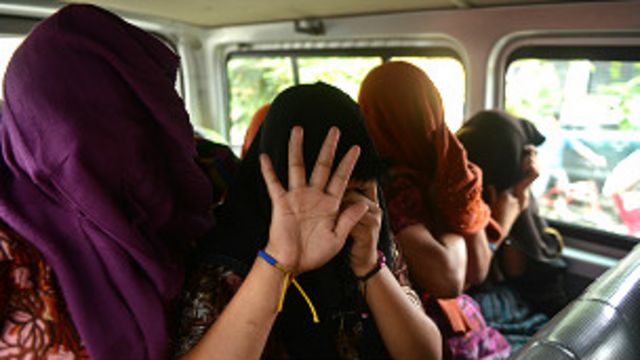Women targeted for trafficking after coup | Burma News International

Women's affairs and human rights activists warned that labor brokers are targeting young Myanmar women for human trafficking as a result of the country's economic downturn and lack of jobs as a result of the military coup.
After the military coup, brokers began to lure young women on social media and use new approaches to target them for human trafficking.
In recent days, it has been reported that Myanmar women who traveled to work in Oman and the UAE are begging for food, and on Facebook, ads have been found looking for brides with incentives to pay hundreds of thousands of cash for Japanese and Chinese men.
In addition, a propaganda video showing the relationship of Chinese man and Myanmar woman from a positive perspective also surfaced on Chinese media.
“When the national economy hits rock bottom, brokers should not take advantage of this bad situation and women. Women's organizations, political activists and other activists should participate in awareness programs,” Daw Hnin Hnin Hmwe from Democratic Party for a New Society told Than Lwin Times.
Persuading young women with incentives of well-paid jobs in other countries is a modern form of human trafficking.
Under the rule of the military council and the lack of rule of law in Myanmar, the probability that the victims of human trafficking will be able to get justice with the help of the government and return to their own country is extremely low.
Human rights activist Ko Thet Swe Win advised women to get in touch with the appropriate groups in this situation rather than believe every mobilization that offers incentives, and information.
Myanmar's neighboring country, China, previously practiced a one-child policy that prioritized a son who could inherit the family name, and is now experiencing a gender imbalance. That's why they started eyeing the trafficked Myanmar women who can get married at a low cost.
In Japan, trafficking in women is mainly aimed at sexual coercion. The topic has gained widespread attention since 2019 thanks to reports from the US State Department, although Myanmar is still mostly unaware of it.
Most Myanmar women who go to work as housemaids in Oman and the UAE are locked up by brokers with insufficient food and water until they find employers. Those who were hired get low wages and face sexual harassment from their landlords, who then run away and become beggars.
The recruiting agents did not deal with these incidents, and the Military Council's Ministry of Social Welfare, Relief, and Resettlement did not say anything about it.
Anti-trafficking activists and Myanmar citizens living abroad have warned “Marrying a foreigner for a job and leaving abroad in a hurry is not an opportunity and there is a high possibility of being cheated. Therefore, women should make sure to ask relevant organizations before going abroad”.
This “Eyes on Trafficking” story is reprinted from its original online location.
 ABOUT PBJ LEARNING
ABOUT PBJ LEARNING
PBJ Learning is a leading provider of online human trafficking training, focusing on awareness and prevention education. Their interactive Human Trafficking Essentials online course is used worldwide to educate professionals and individuals how to recognize human trafficking and how to respond to potential victims. Learn on any web browser (even your mobile phone) at any time.
More stories like this can be found in your PBJ Learning Knowledge Vault.
EYES ON TRAFFICKING
This “Eyes on Trafficking” story is reprinted from its original online location.
ABOUT PBJ LEARNING
PBJ Learning is a leading provider of online human trafficking training, focusing on awareness and prevention education. Their interactive Human Trafficking Essentials online course is used worldwide to educate professionals and individuals how to recognize human trafficking and how to respond to potential victims. Learn on any web browser (even your mobile phone) at any time.
More stories like this can be found in your PBJ Learning Knowledge Vault.
